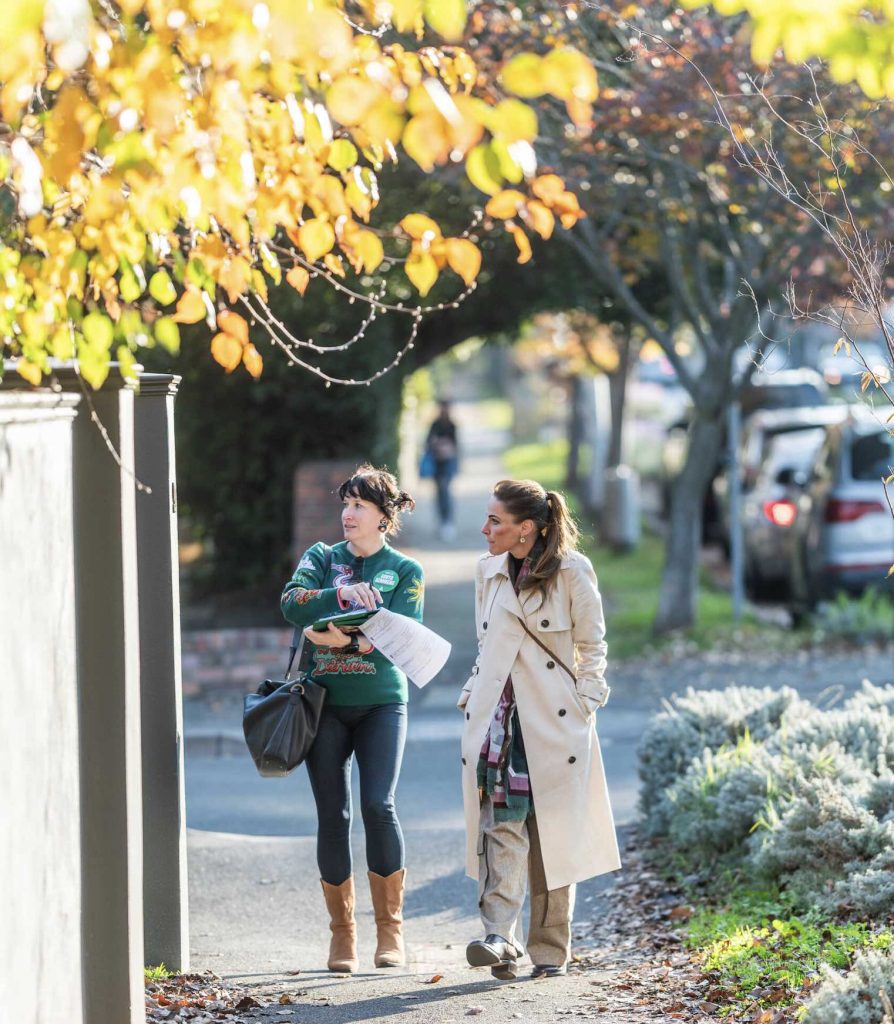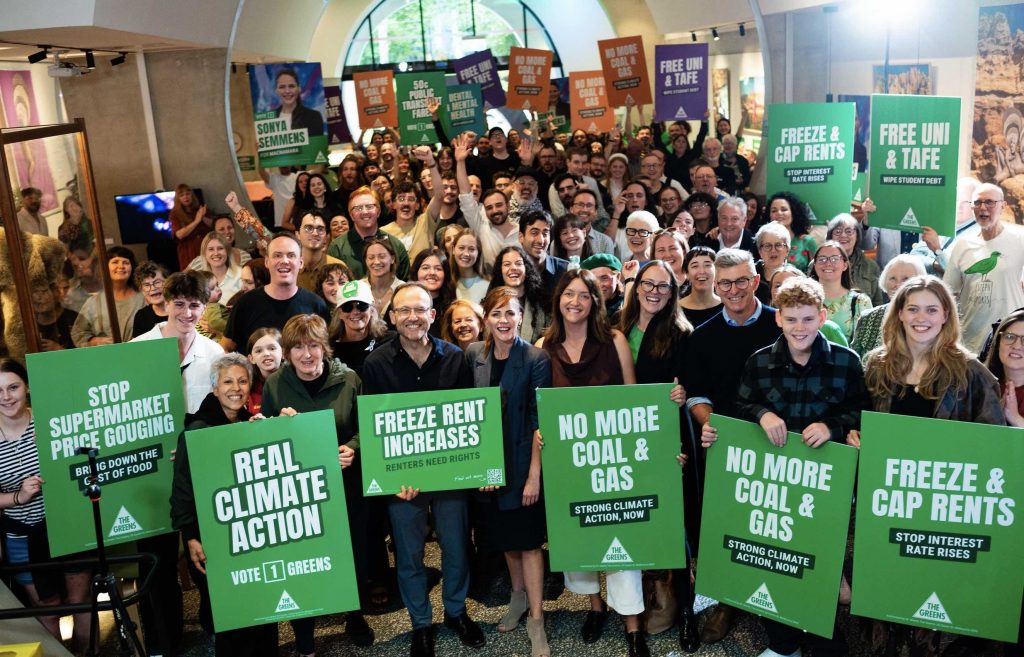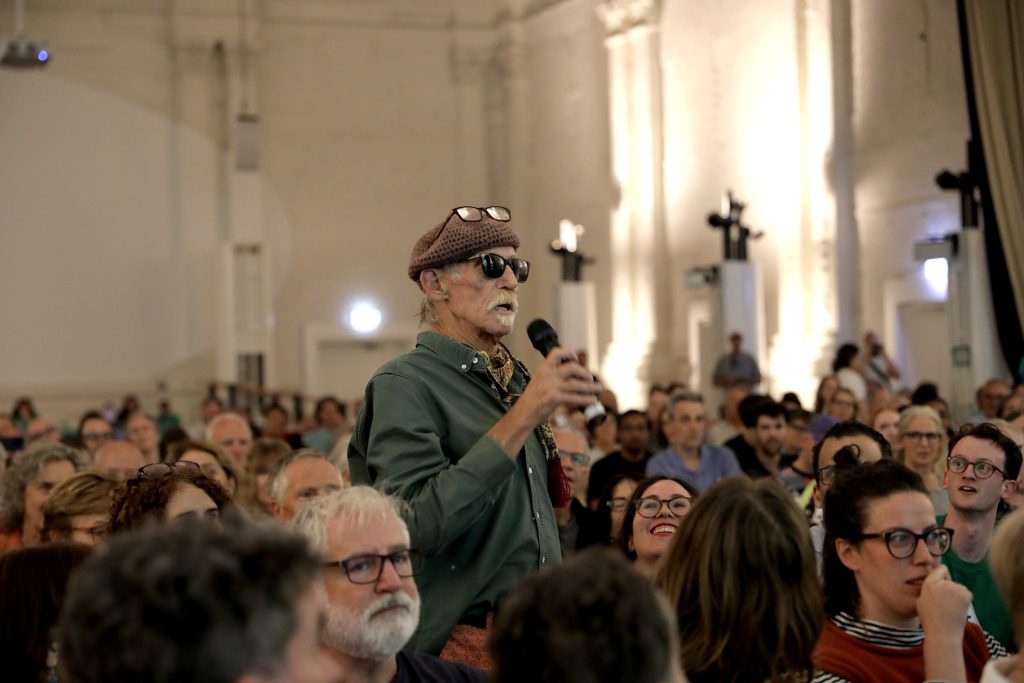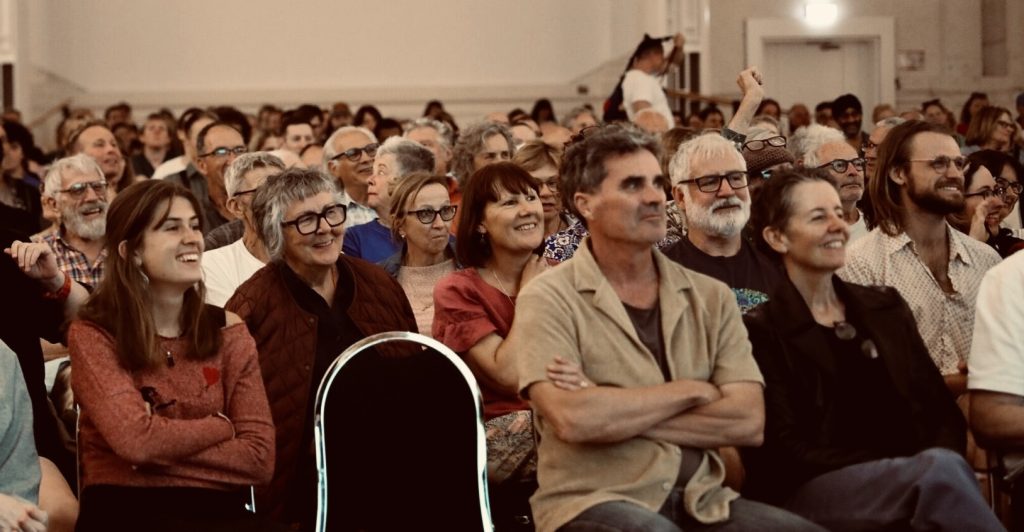“I didn’t win a seat, but my god I’ve won a neighbourhood”, writes Sonya Semmens on her Macnamara campaign. In an atomised society where “people see themselves not as part of a collective, but an individual — alone and powerless”, electoral politics, Sonya argues, must serve the deeper work of rebuilding community.
This morning I took the dog for an early walk like I usually do, down the usual streets.
Past houses I’ve knocked. Past the library where we held baby clothes swaps. Past the housing towers where we ran submission writing workshops with residents. Past the BBQs where we hosted our community “BurritoQs”. Past the church alongside the walk-ups where I had the best cake of my life.
I was feeling sad about [gestures at the world] when a man who lived directly opposite my giant face on a corflute for six months interrupted my pity party with an alarmingly cheerful Morning! Back in the routine!
Then at Kerferd Rd, the couple with the massive dog stopped for a chat about roadworks (and unions). At Montague St the fellow who waters his nature strip waved hello. At the bakery, the cashier winked and said, Glad to see you, it’s definitely colder in Canberra, haha. Even the baker came out for a chat. It felt like a Richard Scarry book! The community I’ve worked my guts out to support was instead supporting me, leaning in to remind me: I belong.
(One second, I think I have something in my eye.)
I didn’t win a seat, but my god I’ve won a neighbourhood. And today, as I sit down to write this article, it feels extremely bloody important. Because I’m going to make a case to you that what we’re doing is not “a campaign” at all.
I think campaigning is just the clothes our revolution is wearing.
Hear me out.
Around the corner from my kids school there’s a 92 year old woman named Anne. She wasn’t on my doorknock list, but occasionally I have to knock on the wrong door to have the right conversation. Anne’s an old leftie, talkative and well-informed, and when I asked her how she thought things were going out in the community she told me this: No one cares anymore. There is no care in our community. She offered me a seat, a cup of tea, and I asked if she lives alone. She replied, I am completely alone. I realised maybe she hadn’t spoken with anyone in a while.

Door knocking across the seat of Macnamara.
1. People in our communities are more isolated than ever
The social infrastructure of communities is falling off a cliff. Club membership is down. Being a committee member is down. Sitting on the Parents & Friends Committee is down. Church attendance and prayer groups are down, belonging to any religion is down (which is an estimated half of social capital, and the origin of civic leadership). Dinner parties, picnics and street parties are down.
At the same time, there’s a hollowing out of civil society – including the collapse in trade union membership from 50% of all workers in the 1980s to just 13% in 2024. As a result, a massive decline in industrial action means the vast majority of people no longer have any experience of wielding collective power. Everything that reflects connection with other people is falling away. So people see themselves not as part of a collective, but an individual – alone and powerless.
Back in the early two thousands I worked with an international development agency, while Desmond Tutu was banging on about this idea, “Ubuntu”. It’s a Bantu concept that really made sense to me this year: I am because we are.
This is the work.
* * *
In leafy Albert Park there’s a street with two men at either end.
The first fellow works in the fossil fuel sector, for companies whose logos you know. He told me he’d worked all over Europe. While I was making ungenerous assumptions, he looked me square in the eye and said, I’ll vote for you if you promise me this – you’ll tax them. They’re getting away with highway robbery. I told him we literally would! That’s our whole thing! He wanted a placard, and sent an email to thank me for coming by.
At the other end of the same road, a young man opened the door to tell me he invests in housing instead of having superannuation. I asked him how he felt about removing tax incentives for people with more than two properties and he nodded with enthusiasm – Yes, I support that. Everyone should have a chance to get into the market if they want to. And I’m really worried about how the housing crisis is affecting people.
Ten minutes away in Elwood a man in his sixties is washing the car in the driveway. I get him talking and he says he’s in construction. I ask how business is going. He says it’s hard to price a job these days because he can’t guarantee materials, but that’s the industry… Actually there’s something else keeping him up at night. He’s heard some corporations pay no tax and send their profits overseas. I explain our Robin Hood tax plan for multinationals and he shakes his head in disbelief. When you came in here I had no idea what I’d talk to you about, he says, but you’ve just said exactly what I’m angry about. I contribute. So should they.
2. People aren’t afraid of radical change
We can move on from the “too extreme” debate, when we’re talking about policy. Macnamara is a bougie bayside electorate by any standards, and even here neoliberalism doesn’t pass the pub test any more. Everyone is watching the old world order unravelling – from martial law in LA, to the genocidal horror of Gaza, and even right here in Port Phillip with the council’s startlingly cruel proposal to fine rough sleepers. People may not be able to thread the needle of petro-fascist kleptocracy, but one after the other, they tell me the system is rigged, or f*cked. Or worst of all, they feel unsafe and can’t say why.
They know change is coming. They know it’s capitalism, or us. All they’re asking for is leadership with the guts to call it what it is – to name the cancer – and to tell us what the plan is. We want leaders with the chops, and the people’s trust (very important), to get it done. And until that arrives, voters want stability – not backwards slippage. Not Dutton. Not Temu Trump. In the face of unreliability, they’ll settle for the devil they know.
Change isn’t safe, so the people bringing it must be. Every single time I brought our radically redistributive platform to my neighbours in a calm, clear voice they were relieved to hear someone speak the truth. In many cases, in that moment, they put their faith in me.
This is the work.
* * *
The first door I ever knocked in Macnamara was a woman in Balaclava who told me she didn’t have anything political to say. We get that a lot. This lady was up in one of those red-brick apartment blocks, so I asked, Are you renting? And she said actually, she’d just received a notice of eviction that day. She stopped half way through the sentence with the words hanging in the air between us, and then her face crumpled. And she started crying. She’d found something political.
In Port Melbourne, I ran into a couple who were suspicious that I’d come to see them. How did I know about them? What did I want? I said, If I’m elected, how would you like me to go to work for you? They told me I wouldn’t likely be able to represent them – they believed government officials were all corrupt, there’s a paedophile ring, our water and air is polluted, and planes are releasing toxic chemicals engineered to lower IQ. I listened carefully. I told them I agreed parliament was captured, but I thought it was captured by fossil fuel, which is indeed a pollutant (and pollution does lower IQ) – had they considered this possibility? They said they were pretty sure it went deeper than that. But they thanked me for listening. No one ever listens. And they’re really, really frightened about these things.

Macamara Campaign launch at the Pride Centre, St Kilda
3. Shockingly little information reaches people in the decomposing shitshow of a media landscape. (But disinformation does.)
I cannot overstate how few people know we’re offering the exact policies they want.
And worse, you’d be shocked to know how many people have legitimate fears, hijacked by disinformation in dark corners of the internet you and I never go. Both those who are uninformed, and those who are cynically misinformed, are being failed by an information landscape that is so decaying it has stopped being useful – and started being really harmful.
Even legacy media is so hostile we can’t rely on them to communicate our messages either. And social media is frustratingly diffuse. We need trusted sources. The neighbourhood WhatsApps, the mother’s groups, the churches and temples, mosques and synagogues, co-ops, sports clubs, the peer to peer relationships, and a new generation of worker organisation. We need a conversation started in the places people gather… right at the moment these places are disappearing. In Macnamara, like other inner urban seats, they’re vanishing faster than ever.
Yet the aching need for community is not. So we’ll have to build this social infrastructure from the ground up, as a movement.
This is the work.
* * *
In St Kilda, I spoke with a dad who didn’t say much at all, just pointed at the Free Mental Healthcare dot point on our flier. That’s very important, he said. I told him how I’ve had to ask myself if my 15-year-old can be fixed in ten sessions. I told him none of us should be asking that question, especially about our kids. I was halfway down the street when his wife came running out. She pressed an email address into my hand, This is who our daughter sees – we’ll both vote for you. My son has an appointment tomorrow morning at 9am (as I write). I don’t mind telling you I’m so relieved I could cry.
And there’s the young mums at the clothes swap. They seem pleased to have a free cup of tea and a chat, and they bring bag after bag of tiny onesies to swap for something slightly bigger. We tell them about our free childcare policy – there’s unanimous support. Why shouldn’t it be free? Like public school should be! One mum nails the mood so perfectly my mouth hangs open, Politics is not on my radar… but life is.
4. Soft support for the Greens is through the roof
I used to tell my campaign manager that if I had a polling booth strapped to my back, I’d have won the election before it began. But of course, we walk back out the front gate and leave people literally to their own devices, and whatever the feed or the press delivers them to muddy (or bury) the message.
Somehow despite this, our national vote held. Despite the biggest investment in attacks against us in political history, despite an historic Labor swing, our vote held. And the reason it did, is because what we do in communities across the nation isn’t just campaigning – it’s building connections and relationships and trust over years and years. Through thick and thin. Through floods and fires.
And this doesn’t end when the election does. If we’re serious about building community, these relationships must be for real. When Rev. Jon brings back raspberry baked cheesecake at the walk-ups’ crafternoon tea, I want to know about it! When rough sleepers are being treated inhumanely by Council, we won’t stay silent. We’ll get involved.
We’re not just campaigning. We’re belonging – together.
This is the work.
* * *
These are just a few stories of thousands of conversations we had at community events or on doorsteps in Macnamara.
Aaaaaaand we didn’t win. Not even close! We knocked on 95,000 doors and built deep and enduring relationships across the community and we still had a 4% swing against us.
The day after the election a woman in Coles told me she’d voted for me, but put Labor first to keep Dutton out. I thanked her and put a dozen cans of refried beans into my trolley for our next BurritoQ.
The SL2s* in Macnamara must be at a record high, but there are no silver medals in politics. Thankfully for us, it was never just about politics.

Town Hall on local environmental issues
5. It was always about community
There will be hot takes and deep analysis of this election in months to come. Maybe they’ll ask whether inner city gentrification is sending Greens-voters scattered throughout the regions. Or we’ll learn more about whether the right wing attack group, Advance, did anything but create noise and make money.
What I do know is that our job is to turn neighbours into neighbourhoods. Co-ops and community dinners into coalitions of the unconventionally-aligned. And we must take the disorganised political energy boiling over in our communities, to create the movement we desperately need.
This is the work.
* * *
As for the politics, I’m incredibly optimistic. Remember when our Senate Seats weren’t safe? And then they were. This time our Lower House seats weren’t safe, but soon they will be.
Political success is the inevitable output of grassroots participatory democracy. Which is just another name for building communities. Which is the social infrastructure that preserves relationships. Which is the key – perhaps the only key – to saving humanity.
And that’s the revolution. One neighbourhood at a time.
* * *
*SL2s = A voter who is given a “Support Level 2” tag in our doorknock data when asked how likely they are to vote Green from 1 to 5 (with 1 being extremely likely and 5 being extremely unlikely).
Sonya Semmens is a community-builder and NGO worker, mum of two, living on the unceded Bunurong lands of the Kulin Nation. She was the Greens candidate for Macnamara in the recent federal election.
Feature images courtesy of Sonya Semmens.

Sonya you are a gem.
I wished I could have worked for you this election but I’ll health got the better of me.
Keep building & inspiring!
Love who you are!
Rosie
The world needs more Sonyas! This was a great read – accessible and real.
A very good article Sonya. Thank you for everything you do. I shouted at the TV a lot, leading up to the election, when people would be interviewed by the mass media and they’d list the things they were worried about or wanted changed. “Then vote Greens”, I’d shout. The Greens had so many policies that perfectly addressed the worries of a lot of people, and yet, they didn’t seem to make the connection. The Greens definitely don’t get a fair trot by the media. Why weren’t the Greens included in the on air debates leading up to the election? I’d love to know how much the Green’s preferences helped Labor get elected. Maybe Green preferences should go elsewhere next election? Anyway, thank you for the opportunity to leave a comment. For me, if you care about the climate crisis, our society and what sort of future awaits our children, and our grandchildren, there is only one party you can vote for – the Greens.
Im sadly disappointed in the outcomes of the election…the ground swell to Greens seems to have dissipated.
I think a deeper look more locally (as you have reflected in your article Sonia), and less worldly geo-political views.
Perhaps a change throughout the Party is now needed to push again to threaten the LEFT and the RIGHT from being
what many see as the only choices. Congratulations on the campaign Sonia. All the best going forward.
“There will be hot takes and deep analysis of this election in months to come. Maybe they’ll ask whether inner-city gentrification is sending Greens voters scattered throughout the regions. Or we’ll learn more about whether the right-wing attack group, Advance, did anything but create noise and make money.”
Or maybe — just maybe — the public finally drew a line.
Maybe voters noticed that this is a party that:
1. Refuses to disendorse candidates and staffers who celebrate the actions of a terrorist group that raped, tortured, and burned civilians alive.
2. Has as one of its most visible MPs a woman who said Jews “have tentacles that reach into everything” — and was promoted, not disciplined, for it.
3. Preselected a candidate who claimed Jews fabricate antisemitic attacks “to play victim” — and quietly let him resign without ever confronting the deeper rot.
4. Hosts rallies where elected representatives chant genocidal slogans and pose in front of signs reading “Put Israel in the bin” — then demand to be taken seriously as advocates for peace.
5. Routinely rebrands Jewish identity and community as “Zionist propaganda” — while affirming and platforming every other form of collective expression.
6. Continues to vote with the Liberals — not just tactically, but with full knowledge of the destabilising effect this has — while claiming to be the party of progressive integrity.
7. Actively benefited from the divisions they helped inflame — cultivating outrage, feeding conspiracies, and stoking hostility rather than bridging it.
Maybe this isn’t just about campaign strategy. Maybe it’s about moral revulsion.
Until the Greens learn that there is a line — that no cause justifies this level of cruelty, dishonesty, or ideological rot — they deserve never to be in government. In fact, they deserve never to be in Parliament at all.
I want to congratulate you on your hard work and fight Sonya no matter the outcome . I want to address @David Strindbergs comments becuase they are so decisive. You certainly do not speak for hundreds and thousands of us who see a genocide when it is a genocide. When the International courts find the Israeli government officials guilty of far right actions. This is not about racism towards Jewish peoples. Many Jewish peoples turn up week in week out remembering what never again means ! Anti Palestine racism is not welcome in MacNamara any more than antisemitism is but for the sake of all humanity stop conflating Zionism with antisemitism. And personally I d not believe the Greens support for human rights es s the reason they didn’t win.
Let’s talk about what the Greens have tolerated—no, embraced:
Jenny Leong used the phrase that Jews “have tentacles that reach into everything.” That’s not a slip-up. That’s a line from the fascist playbook. She wasn’t reprimanded.
Julian Burnside suggested Jews fabricate antisemitic attacks to “play victim.”
Greens MPs have stood proudly at rallies chanting “From the river to the sea,” in front of signs that say “Put Israel in the bin.” That’s not human rights language. That’s eliminationist.
Mehreen Faruqi posed next to an image of the Star of David being discarded like trash. When called out, she claimed ignorance. That image would end careers in any other context—but in the Greens, it’s apparently just another Saturday.
And repeatedly, Jewish communal identity is reduced to “Zionist propaganda”—the only ethnicity whose cultural, historical, and familial bonds are treated as inherently suspect.
You say this isn’t about antisemitism. But in practice, that’s exactly what it is: a relentless delegitimisation of Jewish grief, Jewish safety, Jewish belonging.
And I’ll say something even more uncomfortable: genocides are happening right now in Syria, in Congo, in parts of Russia. But I do not see Syrian, Congolese, or Russian diasporas being forced to pass loyalty tests. I do not see their artists and academics and children being interrogated for their ethnicity. Only Jews are told that before we mourn our dead, we must publicly declare our moral alignment. Only Jews are asked to earn our safety.
That is the double standard. That is the rot. And the Greens have been gleefully complicit in it.
You invoke Jewish protesters, as if the presence of a few voices grants blanket permission for the rest of the party to run riot. It doesn’t. Tokenism is not exoneration.
And no, the Greens didn’t lose despite their stance on Israel. They lost in part because of it. Because decent people—Jews and non-Jews alike—saw the moral evasions, the refusal to condemn the rape and slaughter of October 7 without qualification, the platforming of extremists who romanticise violence, and the sneering dismissal of Jewish fears as “right-wing talking points.”
You say this isn’t about racism. I say it is. It’s just the kind that progressives have taught themselves not to see.
There is a line. The Greens crossed it. Until they return to basic moral decency, they deserve neither power nor platform.
P.S. Let me be clear: I do believe what is unfolding in Gaza constitutes genocide—a monstrous crime against a stateless, brutalised people. But acknowledging that does not absolve the Greens of their own moral collapse. The vast majority of progressive, leftist Jews—those who should have been your natural allies—have been pushed out, silenced, or vilified by a movement that claims to stand for justice while tolerating open antisemitism. That betrayal is not incidental. It is structural. And if you can’t see why so many of us have walked away, then you are not listening—you are choosing not to.
PS:
Apologies for my confusion, it was not Julian Burnside who claimed that Jews fabricate antisemitic attacks to “play victim.” That remark—or a closely related insinuation—originated from the Greens candidate for Blaxland, who publicly stated that, “unlike any other,” the Muslim community does not need to “pay desperate losers to attack or vilify us.” This framing implies that other communities (implicitly Jews) do engage in such behavior—an insidious and defamatory suggestion.
https://greenagenda.org.au/2025/06/post-election-in-the-genocide/
Thank you Omar for your article.
I’ve never been prouder to be a member of the party I helped create thirty five years ago. When Amnesty International, Medicine sans Frontieres, Save the Children and the United Nations tell us it is genocide, apartheid and ethnic cleansing, the Greens are the only party who dare to speak these essential truths. Our media and mainstream parties show craven cowardice and downright dishonesty.
Thank you Greens and all our candidates but especially Omar for this contribution.
Thanks Sonya for your inspiring article and for reminding us how to be an effective movement by your actions as well as words. Being a member of a party and sometimes grassroots non-profit it is depressingly common to find a lack of walking the talk, or indeed hype which is an effective silence, on connecting with and being one with community. Thanks for showing us the path!
Spot on, it’s community and that’s the work. Wonderful piece of sharing